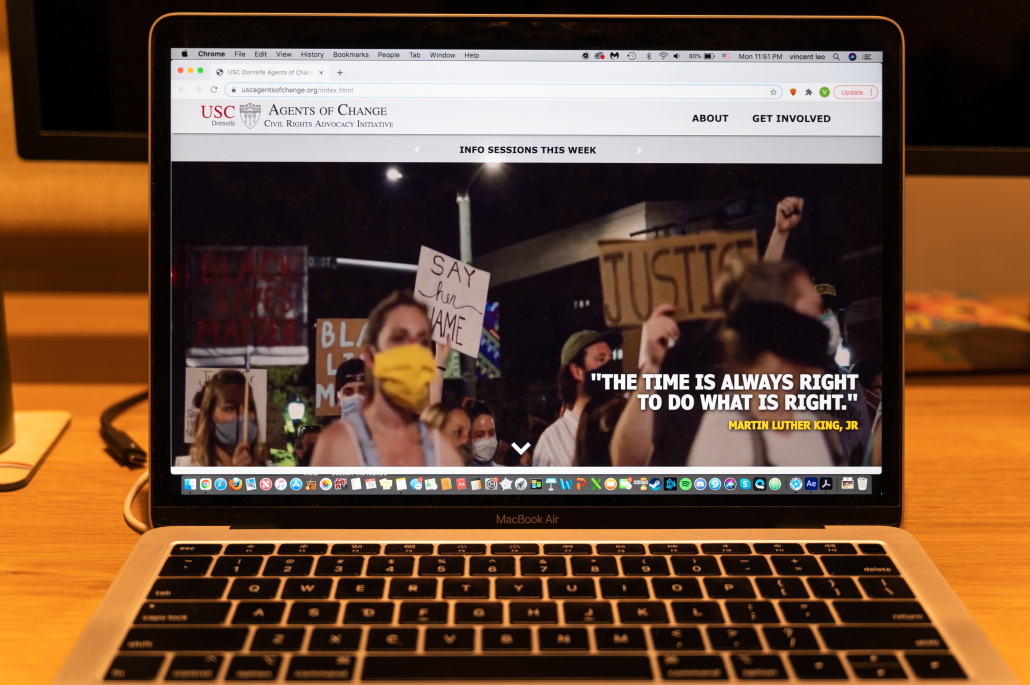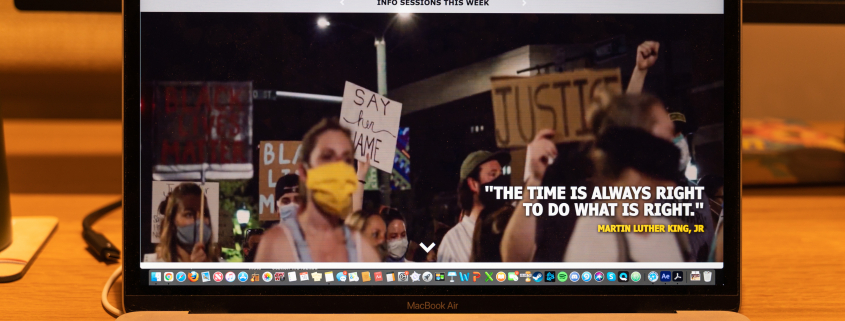Dornsife creates first civil rights undergraduate clinic

After 20 years of civil rights advocacy work with detained migrants, police accountability and unhoused rights by political science professor Olu Orange and his USC Mock Trial program, Dornsife Associate Dean of Experiential Learning Tammy Anderson reached out to Orange to expand his work. Together, they worked to create an experiential learning program with a civil rights focus offered through the Dornsife College of Letters, Arts and Sciences.
Agents of Change, Dornsife’s new civil rights undergraduate clinic, looks to engage students in civil rights advocacy, community activism and governmental policy. Recently launched in Spring 2021, the two-year program allows students to attend specialized education modules and work alongside community partners including Black Lives Matter-Los Angeles, ACLU SoCal, Al Otro Lado, Colors of Change and over 30 other civil rights advocacy groups.
According to Orange, Agents of Change will work with their community partners to assist those facing unfair circumstances such as immigration, racial, employment or law enforcement issues.
“When you look out, particularly in light of recent events politically as well as the global pandemic, there are people suffering tremendously,” Orange said. “We need more people out there fighting for fairness for people in the community who need help.”
The program also aims to provide students with paid opportunities to become involved in civil rights fieldwork. For this reason, the program offers a $1,000 monthly stipend to support students who might work their way through school and otherwise wouldn’t have been able to participate.
“What I have found is that very few Black and brown students get involved in these programs because they often are spending so much time working just to pay bills and be able to have somewhere to live and food to eat while also attending USC, which is extraordinarily expensive,” said Orange.
Agents of Change program assistant Mariah Breit, who has worked multiple jobs throughout her college career to financially support herself, said the stipend was necessary for the program to be accessible to all students.
“I’ve had to turn down opportunities because they’re unpaid, and I knew that I wouldn’t be able to have the time to do that [unpaid] opportunity and still work,” said Breit, a senior majoring in business administration. “I thought about all the students that may be in that same position when looking at Agents of Change and wanting to join the program but also concerned with how they’re going to work and pay their bills.”
Last fall, students interested in Agents of Change submitted short essay answers on collaboration, problem solving and issues that personally affect them. Program Manager Kath Rogers, said the program welcomed 12 undergraduate students to do work on campaigns and projects in the community.
“I think what’s really unique about Agents of Change is that it’s linking the classroom to the community — and not just talking about justice issues but actually having students work alongside community members who are fighting for their own rights,” Rogers said.
In addition to virtual fieldwork, students this semester will also engage in coordinated education modules and courses in which they will discuss current civil rights topics including social movements, lawsuits, budgets and campaigns. Rogers also said the program plans to invite activists as guest speakers for the course.
“We learn through history books in a lot of different ways,” Rogers said. “But to have guest speakers and to have these kinds of lived experiences and learning tools in the classroom and also have students learning from their own hands on experience is really unique.”
Throughout the course of the program, students will rotate and engage through various community partners specializing in legal, governmental and communal activism, such as the California Governor’s Office and the Los Angeles Office of Civil and Human Rights.
Katherine Owojori, a sophomore majoring in political science, will be working with Black Lives Matter-Los Angeles this semester. Owojori said Agents of Change will allow her to immerse herself into the world of civil rights and political reform and experience new environments without the worry of having an internship lined up for each semester.
“I look forward to finding out ways that I can help on a more grand scale,” Owojori said. “With all of the social justice reform that began this summer, I constantly felt like I couldn’t do anything and that finding petitions and then educating people was one thing, but I always felt that I should be able to do more. What I’m excited about is to be able to be a part of what Black Lives Matter wishes to accomplish in a real way.”
Alyssa Matias, a member of Agents of Change working with ACLU SoCal, said the program is imperative to showing undergraduate students that they have power to enact change in their communities.
“It is extremely important that not just USC, but all universities follow in our footsteps and make sure that there’s a platform for undergraduate students to be not just civically engaged but engaged in pursuing social justice, racial justice and economic justice,” said Matias, a sophomore majoring in political science. “Universities across the country have to be active in pursuing that because there’s just too much going on for people to just sit back and let other people decide things for them.”
Correction: A previous version of this article misstated Kath Rogers’ position as program director when she is the program manager of Agents of Change. The Daily Trojan regrets this error.

